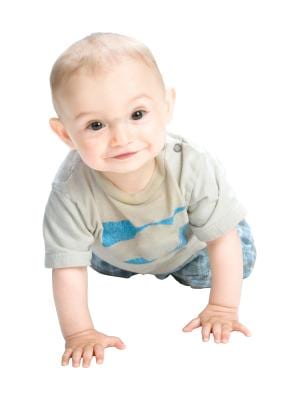Having a baby is filled with “firsts”: the first time your baby can control his head, sit up on his own, wave bye-bye, crawl and walk. The infant to toddler years have your baby learning how to pick things up, making sounds and then words, playing with you and generally noticing the world around him. All babies develop at different rates, but certain milestones fall in a general age range.
The First Years
Your baby develops and learns like crazy in the first years. Major milestones you can expect are rolling over, sitting up, standing and walking. Hearing “mama” or “dada” will undoubtedly bring you and your partner much joy. Some babies excel in language and fall behind in crawling or walking, or vice versa.
Milestones
At 1 month of age, most babies can bring their hands to their face, make a fist, move their head from side to side while lying on the stomach, recognize your voice and prefer human faces to shapes. By 3 months of age, most babies can raise their head while lying on the stomach, kick their legs, grab and shake toys, follow moving objects, babble and smile at your voice. By 7 months of age, most babies can sit up by themselves, crawl, pull up to stand, imitate words, find hidden objects and wave goodbye. By 2 years of age, most children can walk, pull toys behind them, carry toys, run, kick a ball, climb on furniture, scribble, build a block tower, recognize names of people and body parts, use simple sentences, follow simple instructions and show independence.
Concerns
If you are concerned about your baby’s development, talk to your doctor. It’s better to talk to your doctor as soon as you are concerned because the sooner you recognize and get help for a problem, the better chance your child has to reach her potential. Your doctor may recommend a specialist who can conduct an in-depth evaluation of your child. Specialists include developmental pediatricians who work with children with special needs, child neurologists who work on the brain and spine and child psychologists or psychiatrists who evaluate the mind. To get started, call your doctor’s office and say that you are concerned about your child’s development.
Meeting Needs
Much of a child’s development from birth through childhood depends on the nutritional, intellectual, emotional and medical support parents and caregivers provide, say Dr. Theresa Hawley and Dr. Megan Gunner in their publication, “Starting Smart.” Genetics alone do not determine development after birth, say Hawley and Megan; rather, growth and development are highly dependent on childhood experiences. It’s vital for your baby to interact with people and objects. Just as good experiences help healthy development, neglect and abuse can lead to difficulties, including mental retardation and emotional problems.
Your Role
When your baby’s needs are met, he can go on to focus his attention on exploring his world. But if his needs are unmet or met roughly, the infant focuses on ensuring that his needs are met, shutting out the stimulation he needs to develop other skills. You and the caregivers you choose, according to Hawley and Megan, play an important role in helping your child succeed in life.





